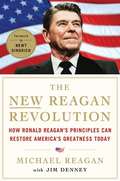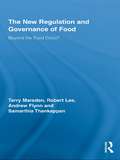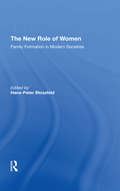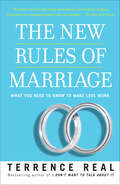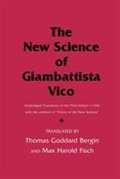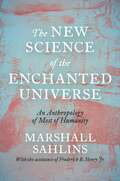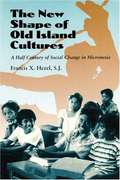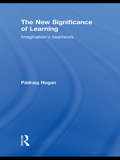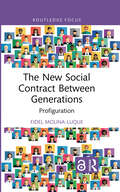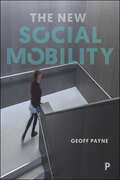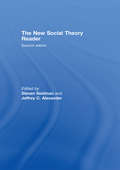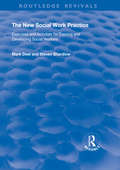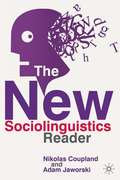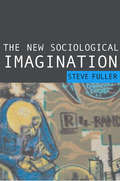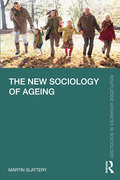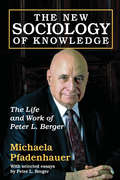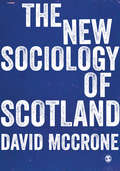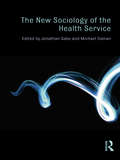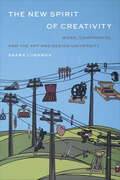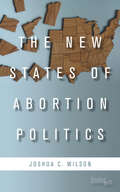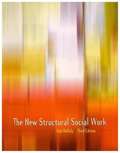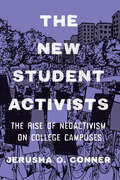- Table View
- List View
The New Reagan Revolution: How Ronald Reagan's Principles Can Restore America's Greatness
by Newt Gingrich Jim Denney Michael ReaganThe challenges and threats we as a nation face today are eerily similar to the conditions in the world before the beginning of the Reagan era. In his famous 1976 speech at the Republican National Convention, Ronald Reagan helped define a way forward and strengthened the Republican Party. As we stand at a crossroad once again, we are fortunate to have a blueprint for restoring America's greatness. Reagan has given us the principles to succeed. This book is not merely a diagnosis of our nation's ills, but a prescription to heal our nation, rooted in the words and principles of Ronald Reagan. In these pages, Michael Reagan shares the plan his father developed over years of study, observation, and reflection. It is the plan he announced to the nation, straight from his heart, one summer evening during America's 200th year. It's the plan he put into action during his eight years in office as one of the most effective presidents of the 20th century, and it is the plan we can use today to help return America to its former greatness, soundness, and prosperity.
The New Regulation and Governance of Food: Beyond the Food Crisis? (Routledge Studies in Human Geography)
by Robert Lee Terry Marsden Andrew Flynn Samarthia ThankappanMajor questions surround who, how, and by what means should the interests of government, the private sector, or consumers hold authority and powers over decisions concerning the production and consumption of foods. This book examines the development of food policy and regulation following the BSE (mad cow disease) crisis of the late 1990s, and traces the changing relationships between three key sets of actors: private interests, such as the corporate retailers; public regulators, such as the EU directorates and UK agencies; and consumer groups at EU and national levels. The authors explore how these interests deal with the conundrum of continuing to stimulate a corporately organised and increasingly globalised food system at the same time as creating a public and consumer-based legitimate framework for it. The analysis develops a new model and synthesis of food policy and regulation which reassesses these public/private sector responsibilities with new evidence and theoretical insights.
The New Role Of Women: Family Formation In Modern Societies
by Hans-peter Blossfeld Kathleen KiernanThis is the first book to systematically track postwar changes in family formation in Western Europe and the United States. Cohabitation and motherhood outside of marriage have become more widespread at the same time that women’s social roles are evolving. Women are attaining higher levels of education, marrying at an older age, more frequently working outside the home, and have more reproductive freedom due to new advances in contraception. In this original collection of essays, sociologists and demographers from eight Western European countries and the United States use longitudinal data to compare national variations and explain the connection between the new role of women and family formation in postwar society. The contributors provide a thorough review of the social demographic literature to advance a variety of hypotheses about the relationships between changing women’s education and family formation outcomes, which are empirically examined and compared across countries.
The New Rules of Marriage: What You Need To Know To Make Love Work
by Terrence RealIn his extraordinary new book, Terrence Real, distinguished therapist and bestselling author, presents a long overdue message that women need to hear: You aren’t crazy–you’re right! Women have changed in the last twenty-five years–they have become powerful, independent, self-confident, and happy. Yet many men remain irresponsible and emotionally detached. They don’t know how to respond to frustrated partners who just want their mates to show up and grow up.Enter the good news: In this revolutionary book, Real shows women how to master the new rules of twenty-first-century marriage by offering them a set of effective tools with which they can create the truly intimate relationship that they desire and deserve. He identifies five non-starters to avoid and shares practical strategies for bringing honesty, passion, and joy back to even the most difficult relationship. Using his experience helping thousands of couples shift from despair to profound emotional closeness, Real guides you through the process of relationship repair with exercises that you can do alone or with your partner. With this program you’ll discover how to - identify and articulate your wants and needs - listen well and respond generously - set limits, and stand up for yourself - embrace and appreciate what you have - know when to seek outside helpThe New Rules of Marriage will introduce you to a radically new kind of relationship, one based on the idea that every woman has the power to transform her marriage, while men, given the right support, have it in them to rise to the occasion.We have never wanted so much from our relationships as we do today. More than any other generation, we yearn for our mates to be lifelong friends and lovers. The New Rules of Marriage shows us how to fulfill this courageous and uncompromising new vision.
The New Science of Ageing (The New Dynamics of Ageing)
by Alan WalkerThis unique book represents the first multi-disciplinary examination of ageing, covering everything from basic cell biology, to social participation in later life, to the representations of old age in the arts and literature. A comprehensive introductory text about the latest scientific evidence on ageing, the book draws on the pioneering New Dynamics of Ageing Programme, the UK’s largest research programme in ageing. This programme brought together leading academics from across the arts and humanities, social and biological sciences and fields of engineering and medical research, to study how ageing is changing and the ways in which this process can be made more beneficial to both individuals and society. Comprising individual, local, national and global perspectives, this book will appeal to everyone with an interest in one of the greatest challenges facing the world – our own ageing.
The New Science of Giambattista Vico: Unabridged Translation of the Third Edition (1744) with the addition Of "Practice of the New Science"
by Giambattista Vico Thomas Goddard Bergin Max Harold FischA pioneering treatise that aroused great controversy when it was first published in 1725, Vico's New Science is acknowledged today to be one of the few works of authentic genius in the history of social theory. It represents the most ambitious attempt before Comte at comprehensive science of human society and the most profound analysis of the class struggle prior to Marx.
The New Science of the Enchanted Universe: An Anthropology of Most of Humanity
by Marshall SahlinsOne of the world’s preeminent cultural anthropologists leaves a last work that fundamentally reconfigures how we study most other culturesFrom the perspective of Western modernity, humanity inhabits a disenchanted cosmos. Gods, spirits, and ancestors have left us for a transcendent beyond, no longer living in our midst and being involved in all matters of everyday life from the trivial to the dire. Yet the vast majority of cultures throughout human history treat spirits as very real persons, members of a cosmic society who interact with humans and control their fate. In most cultures, even today, people are but a small part of an enchanted universe misconstrued by the transcendent categories of “religion” and the “supernatural.” The New Science of the Enchanted Universe shows how anthropologists and other social scientists must rethink these cultures of immanence and study them by their own lights.In this, his last, revelatory book, Marshall Sahlins announces a new method and sets an exciting agenda for the field. He takes readers around the world, from Inuit of the Arctic Circle to pastoral Dinka of East Africa, from Araweté swidden gardeners of Amazonia to Trobriand Island horticulturalists. In the process, Sahlins sheds new light on classical and contemporary ethnographies that describe these cultures of immanence and reveals how even the apparently mundane, all-too-human spheres of “economics” and “politics” emerge as people negotiate with, and ultimately usurp, the powers of the gods.The New Science of the Enchanted Universe offers a road map for a new practice of anthropology that takes seriously the enchanted universe and its transformations from ancient Mesopotamia to contemporary America.
The New Shape of Old Island Cultures: A Half Century of Social Change in Micronesia
by Francis X. HezelThe broad range of topics covered includes family structure, land, gender roles, cultural treatment of life events (birth, marriage, death), sexuality, political authority, and demography and migration. Hezel argues that the primary engine of social change in Micronesia has been the dramatic shift from subsistence fishing and gardening to salaried employment in a cash economy. He makes the case that this fundamental change has fragmented the extended family, changed the way land is viewed, revolutionized gender roles, and paved the way for an ethics of individualism.
The New Significance of Learning: Imagination's Heartwork
by Pádraig HoganShould education be understood mainly as a practice in its own right, or is it essentially a subordinate affair to be shaped and controlled by a society’s powers-that-be? What difference does it make if students are chiefly viewed as recipients of a set of skills and knowledge, or as active participants in their own learning? Does education have a responsibility in cultivating humanity’s maturity, or are its purposes to be effectively matched to the functional requirements of a globalized age? The New Significance of Learning explores these and other high-stakes questions. It challenges hierarchical and custodial conceptions of education that have been inherited as the ‘natural order’ of things. It discloses a more original and imaginative understanding of educational practice, illustrating this understanding with frequent practical examples. Among the merits highlighted by this approach are: a recognition that education is first and foremost an invitation to join a renewed experience of quest and disclosure; a realisation that taking up and pursuing such an invitation is a basic right, as distinct from a privilege to be bestowed or withheld; an awareness of the decisive importance of specific kinds relationships in practices of teaching and learning; an emphasis on the human qualities as well as the intellectual achievements nourished by dedicated communities of learning; an acknowledgement of partiality – of incompleteness and bias – in even the best of humankind’s learning efforts; the emergence of a distinctive ethical orientation for education as a practice in its own right.
The New Social Contract Between Generations: Profiguration (Routledge Advances in Sociology)
by Fidel Molina-LuqueThe cornerstone of this book is the innovative concept of profiguration, a term coined by Fidel Molina-Luque to encapsulate the essential agreement and recognition required between generations in contemporary society.Profiguration emphasises the intrinsic value of interdependence across all age groups, fostering a holistic life experience for the young, adults and the elderly. Rooted in our social nature, especially crucial amid the current crisis, profiguration becomes a poignant antidote to loneliness. The imperative of mutual love and care is heightened, illuminating the path to a fulfilled existence. This book advocates a paradigm shift through the lenses of sociology and social sciences, stressing the urgency of a mindset overhaul. It calls for a new social contract grounded in altruism for both current and future generations, highlighting the importance of love, solidarity and dialogue. Beyond interpersonal dynamics, it underscores the pivotal roles of education, sustainability and environmental stewardship, aspiring to shape a more promising present and future within a conscientious societal framework.Tailored to engage scholars, professionals and students alike, its accessible concepts are easily comprehensible and applicable across the following fields: sociology, anthropology, social work, education, law and business administration and health studies (medicine, nursing, physiotherapy), among others.Chapters 1, 3 and 5 of this book is freely available as a downloadable Open Access PDF at http://www.taylorfrancis.com under a Creative Commons Attribution (CC BY] 4.0 license.
The New Social Division: Making and Unmaking Precariousness (Palgrave Studies in European Political Sociology)
by Donatella Della Porta Tiina Silvasti Sakari Hänninen Martti SiisiäinenThis volume addresses issues of precariousness in a broad, interdisciplinary perspective, looking at socio-economic transformations as well as the identity formation and political organizing of precarious people. The collection bridges empirical research with social theory to problematize and analyse the precariat.
The New Social Division: Making and Unmaking Precariousness (Palgrave Studies in European Political Sociology)
by Donatella Della Porta Tiina Silvasti Sakari Hänninen Martti SiisiäinenThis volume addresses issues of precariousness in a broad, interdisciplinary perspective, looking at socio-economic transformations as well as the identity formation and political organizing of precarious people. The collection bridges empirical research with social theory to problematize and analyse the precariat.
The New Social Mobility: How the Politicians Got It Wrong
by Geoff PayneDespite becoming a big issue in public debate, social mobility is one of the most misunderstood processes of our time. In this accessible and engaging text, Geoff Payne, one of Britain’s leading mobility analysts, presents up-to-date sociological research evidence to demonstrate how our politicians have not grasped the ways in which mobility works. The new social mobility argues for considering a wider range of dimensions of mobility and life chances, notably the workings of the labour market, to assess more accurately the causes and consequences of mobility as social and political processes. Bringing together a range of literature and research, it covers key themes of mobility analysis, and offers a critical and original approach to social mobility. This important book will challenge the well-established opinions of politicians, pressure groups, the press, academics and the public; it is also sufficiently comprehensive to be suitable for teaching and of interest to a broad academic audience.
The New Social Theory Reader
by Steven Seidman; Jeffrey C. AlexanderThis is the first anthology to thematize the dramatic upward and downward shifts that have created the new social theory, and to present this new and exciting body of work in a thoroughly trans-disciplinary manner. In this revised second edition readers are provided with a much greater range of thinkers and perspectives, including new sections on such issues as imperialism, power, civilization clash, health and performance. The first section sets out the main schools of contemporary thought, from Habermas and Honneth on new critical theory, to Jameson and Hall on cultural studies, and Foucault and Bourdieu on poststructuralism. The sections that follow trace theory debates as they become more issues-based and engaged. They are:the post-foundational debates over morality, justice and epistemological truththe social meaning of nationalism, multiculturalism and globalizationidentity debates around gender, sexuality, race, the self and post-coloniality.This new edition provides more ample biographical and intellectual introductions to each thinker, and substantial introductions to each of the major sections. The editors introduce the volume with a newly revised, interpretive overview of social theory today.The New Social Theory Reader is an essential, reliable guide to current theoretical debates.
The New Social Work Practice: Exercises and Activities for Training and Developing Social Workers (Routledge Revivals)
by Mark Doel Steven ShardlowFirst published in 1998, this book is a fully revised and updated edition of Social Work Practice, first published in 1993 as a training manual. The New Social Work Practice presents a comprehensive view of contemporary social work. Whether it be general or specialist practice, care and control or power and oppression, these central issues and recurring themes are given a topical treatment. Changes in core aspects of social work are fully explored in lively and realistic ways, combining the essence of good practice with current organizational demands. The aim of the original workbook remains intact: to guide and stimulate learning about social work practice. The book achieves this purpose by presenting various aspects of social work using different settings and contexts. New and revised activities are included to promote discussion, understanding, learning and better practice. Taken toether, the topics and themes in the book define the essential elements of a curriculum for social work practice.
The New Sociolinguistics Reader (2nd Edition)
by Adam Jaworski Nikolas CouplandFully updated and expanded for the second edition, this core textbook provides rigorous coverage of the key themes and debates at the cutting edge of sociolinguistics research and brings together many of the most influential scholars in the field. Comprising six distinctive parts and almost fifty individual chapters, it introduces students to a wealth of issues in sociolinguistics, including refashioning linguistic identities, code-switching, language rights and the social functions of small talk. Chapters are richly illustrated with examples and informed by the latest scholarly debates.
The New Sociological Imagination
by Steve FullerC. Wright Mills′ classic The Sociological Imagination has inspired generations of students to study Sociology. However, the book is nearly half a century old. What would a book address, aiming to attract and inform students in the 21st century? This is the task that Steve Fuller sets himself in this major new invitation to study Sociology. The book: Critically examines the history of the social sciences to discover what the key contributions of sociology have been and how relevant they remain. Demonstrates how biological and sociological themes have been intertwined from the beginning of both disciplines, from the 19th century to the present day. Covers virtually all of sociology′s classic theorists and themes. Provides a glossary of key thinkers and concepts. This book sets the agenda for imagining sociology in the 21st century and will attract students and professionals alike.
The New Sociology of Ageing (Routledge Advances in Sociology)
by Martin SlatteryThe New Sociology of Ageing explores the challenges and opportunities of ageing as a global force. Alongside globalisation, urbanisation, new technology, climate change, and global pandemics, ageing is transforming life in the twenty-first century. Through the eyes of a young sociology student and her multigenerational family, this book sets out a new sociological framework to interpret ageing societies. It explores how the ‘New Old’ – the baby boomer generation – might be mobilised as an agency of social change in transforming later life. It proposes this generation as the co-architects of a new intergenerational social contract for the era ahead, rather than as the recipients of a post-war twentieth-century social contract that society can no longer support. Taking Britain as a case study and societies across the world as examples, Slattery explores emerging revolutions in work and retirement, potential crises in pensions, healthcare and housing, as well as transformations in family life and in our attitudes to sex and death in later life. This book provides a clear overview of the sociology of ageing. It introduces students to demography as a sociological force of the future, and to the perils and the promises of longevity as societies across the world approach the Hundred-Year Life. This book will be of interest to undergraduate students and early scholars in the social sciences, particularly in sociology, gerontology, social policy, and public health.
The New Sociology of Knowledge: The Life and Work of Peter L. Berger
by Michaela PfadenhauerA classical sociologist can be defined as someone whose works occupied a central position among the sociological ideas and notions of an era. Following this criterion, Michaela Pfadenhauer demonstrates the relevance of Peter L. Berger's work to the sociology of knowledge. Pfadenhauer shows that Berger is not only a sociologist of religion, but one whose works are characterized by a sociology-of-knowledge perspective.Berger stands out among his fellow social scientists both quantitatively and qualitatively. He has written numerous books, which have been translated into many languages, and a multitude of essays in scholarly journals and popular magazines. For decades, he has played a role in shaping both public debate and social scientific discourse in America and far beyond.As a sociologist of knowledge, Berger has played three roles: he has been a theoretician of modern life, an analyst of modern religiosity, and an empiricist of global economic culture. In all areas, the focus on processes rather than status quo is characteristic of Berger's thinking. This book provides an in-depth view on the critical thinking of one of the most important sociologists that present times has to offer. It includes four written essays by Berger.
The New Sociology of Scotland
by David McCroneWritten by a leading sociologist of Scotland, this ground-breaking new introduction is a comprehensive account of the social, political, economic and cultural processes at work in contemporary Scottish society. At a time of major uncertainty and transformation The New Sociology of Scotland explores every aspect of Scottish life. Placed firmly in the context of globalisation, the text: examines a broad range of topics including race and ethnicity, social inequality, national identity, health, class, education, sport, media and culture, among many others. looks at the ramifications of recent political events such as British General Election of 2015, the Scottish parliament election of May 2016, and the Brexit referendum of June 2016. uses learning features such as further reading and discussion questions to stimulate students to engage critically with issues raised. Written in a lucid and accessible style, The New Sociology of Scotland is an indispensable guide for students of sociology and politics.
The New Sociology of the Health Service
by Jonathan Gabe Michael CalnanHealth service policy and health policy have changed considerably over the past fifteen years and there is a pressing need for an up-to-date sociological analysis of health policy. Not only have policies themselves changed but new policy themes – such as evidence-based policy and practice, an increasing focus on a primary care led health service, a growing recognition of the need to address inequalities through public health policies and a focus on the views and the voice of the user and the public– have emerged alongside some of the old. Following up the very successful The Sociology of the Health Service, this all-new volume covers a broad range of key contemporary health services issues. It includes chapters on consumerism, technology, evidence-based practice, public health, managerialism and social care among others, and incorporates references to new developments, such as regulation and incentivization, throughout. The New Sociology of the Health Service provides a vital new sociological framework for analyzing health policy and healthcare. It is an important read for all students and researchers of medical sociology and health policy.
The New Spirit of Creativity: Work, Compromise, and the Art and Design University
by Saara LiinamaaThe New Spirit of Creativity examines creativity as an embedded institutional value and priority within public art institutions and higher education. The book unpacks the everyday work, organization, and administration of artistic creativity and its clashes with a "new spirit" of creativity that has widely taken hold. Based on fieldwork conducted at three art and design universities in Canada, Saara Liinamaa tackles the fraught landscape of contemporary higher education, the uncertainties of cultural work, and ongoing concerns around austerity in Canada. This book traces how creativity is not simply practiced within the art school, but also inequitably recognized and rewarded. Liinamaa identifies the many compromises required between artistic creativity and the new spirit, while demonstrating how not all compromises are created equally; compromise can support or erode creative diversity. Drawing on a range of original sources – including interviews, participant observation, policy and planning, and media – this work makes a compelling case as to why art and design schools are worthy of sustained attention. By connecting shared interests across sociology, education, cultural studies, art history, and cultural theory, The New Spirit of Creativity makes a novel and agenda-setting contribution to our understanding of artistic creativity, compromise, and cultural work.
The New States of Abortion Politics
by Joshua WilsonThe 2014 Supreme Court ruling on McCullen v. Coakley striking down a Massachusetts law regulating anti-abortion activism marked the reengagement of the Supreme Court in abortion politics. A throwback to the days of clinic-front protests, the decision seemed a means to reinvigorate the old street politics of abortion. The Court's ruling also highlights the success of a decades' long effort by anti-abortion activists to transform the very politics of abortion. The New States of Abortion Politics, written by leading scholar Joshua C. Wilson, tells the story of this movement, from streets to legislative halls to courtrooms. With the end of clinic-front activism, lawyers and politicians took on the fight. Anti-abortion activists moved away from a doomed frontal assault on Roe v. Wade and adopted an incremental strategy--putting anti-abortion causes on the offensive in friendly state forums and placing reproductive rights advocates on the defense in the courts. The Supreme Court ruling on Whole Woman's Health v. Hellerstedt in 2016 makes the stakes for abortion politics higher than ever. This book elucidates how--and why.
The New Structural Social Work: Ideology, Theory, Practice
by Bob MullalyThe New Structural Social Work reveals the shortcomings of conventional social work, which accepts and participates in the present social order rather than addressing the systemic social problems that exist within capitalist societies. Mullaly advocates for a progressive view of social work that is practiced within the social agency, outside of the agency, and within the personal lives of structural social workers.
The New Student Activists: The Rise of Neoactivism on College Campuses
by Jerusha O. ConnerMeet the new breed of student activists—uncompromising, focused, and connected.Activism is once again back on college campuses as students protest issues such as sexual assault, climate change, racial injustice, and student debt. It's perhaps unsurprising that the current political moment has triggered the rise of a new breed of student activist—uncompromising, focused, and connected. But many pundits have variously derided student activists as either "snowflakes," too fragile to encounter opinions that run contrary to their own, or as "social justice warriors" who aggressively fight against those who transgress the ever-changing bounds of political correctness. The New Student Activists moves beyond these simple stereotypes and convenient caricatures to examine the nuanced motives and complex experiences of real-life, present-day college student activists.Jerusha O. Conner offers insight into who these student activists are—the causes they care about, the strategies they deploy, the factors that motivate and sustain them, and the impact they have had on their campuses and beyond. Conner dubs today's student activists "neoactivists," who borrow from and build on the legacies of past generations of college student activists. Exploring when, how, and why this diverse group of students turned to activism, Conner examines the social and educational influences on their sociopolitical development. She also reveals the fraught but mutually transformative relationship between institutions of higher education and student activists in the contemporary moment. Written for anyone interested in better understanding the latest wave of student activism on campuses, The New Student Activists raises fascinating implications for developmental theory and higher education policy and practice.
